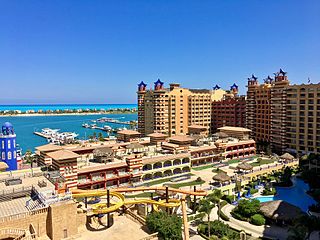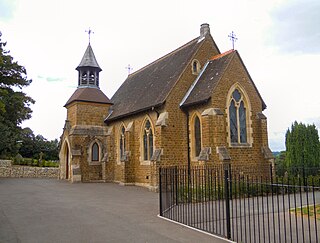
El Alamein is a town in the northern Matrouh Governorate of Egypt. Located on the Mediterranean Sea, it lies 106 kilometres (66 mi) west of Alexandria and 300 kilometres (186 mi) northwest of Cairo. The town is located on the site of the ancient city Antiphrai which was built by the Romans.(Greek: Ἀντίφραι).

A Tomb of the Unknown Soldier or Tomb of the Unknown Warrior is a monument dedicated to the services of an unknown soldier and to the common memories of all soldiers killed in war. Such tombs are located in many nations and are usually high-profile national monuments. Throughout history, many soldiers have died in war with their remains being unidentified. Following World War I, a movement arose to commemorate these soldiers with a single tomb, containing the body of one such unidentified soldier.

The Commonwealth War Graves Commission (CWGC) is an intergovernmental organisation of six independent member states whose principal function is to mark, record and maintain the graves and places of commemoration of Commonwealth of Nations military service members who died in the two World Wars. The commission is also responsible for commemorating Commonwealth civilians who died as a result of enemy action during the Second World War. The commission was founded by Sir Fabian Ware and constituted through royal charter in 1917 as the Imperial War Graves Commission. The change to the present name took place in 1960.

Brookwood Cemetery, also known as the London Necropolis, is a burial ground in Brookwood, Surrey, England. It is the largest cemetery in the United Kingdom and one of the largest in Europe. The cemetery is listed a Grade I site in the Register of Historic Parks and Gardens.

Groesbeek Canadian War Cemetery and Memorial is a Second World War Commonwealth War Graves Commission military war grave cemetery, located in the village of Groesbeek, 8 km (5.0 mi) southeast of Nijmegen in the Netherlands. Of the total 2,619 burials, the cemetery contains 2,338 Canadian soldiers. It was built to a design by Commission architect Philip Hepworth.

South London Crematorium and Streatham Park Cemetery is a cemetery and crematorium on Rowan Road in Streatham Vale. It has always been privately owned and managed and is now part of the Dignity plc group. The South London Crematorium is situated within the cemetery grounds and opened in 1936.

Harrogate (Stonefall) Cemetery is a Commonwealth War Graves Commission (CWGC) burial ground for the dead of the First World War and Second World War located on the outskirts of Harrogate in North Yorkshire, England.

Southern Cemetery is a large municipal cemetery in Chorlton-cum-Hardy, Manchester, England, 3 miles (4.8 km) south of the city centre. It opened in 1879 and is owned and administered by Manchester City Council. It is the largest municipal cemetery in the United Kingdom and the second largest in Europe.

The Bayeux War Cemetery is the largest Second World War cemetery of Commonwealth soldiers in France, located in Bayeux, Normandy. The cemetery contains 4,648 burials, mostly from the Invasion of Normandy. Opposite this cemetery stands the Bayeux Memorial which commemorates more than 1,800 casualties of the Commonwealth forces who died in Normandy and have no known grave.

The Pozières Memorial is a World War I memorial, located near the commune of Pozières, in the Somme department of France, and unveiled in August 1930. It lists the names of 14,657 British and South African soldiers of the Fifth and Fourth Armies with no known grave who were killed between 21 March 1918 and 7 August 1918, during the German advance known as the Spring Offensive, and the period of Allied consolidation and recovery that followed. The final date is determined by the start of the period known as the Advance to Victory on 8 August.

Blue Beach Military Cemetery at San Carlos is a British war cemetery in the Falkland Islands holding the remains of 14 of the 255 British casualties killed during the Falklands War in 1982, and one other killed in early 1984. It is situated close to where 3 Commando Brigade had its initial headquarters after landing on 21 May 1982.

The Arras Flying Services Memorial Commonwealth War Graves Commission war memorial in the Faubourg d'Amiens Cemetery, Arras, France. The memorial commemorates nearly 1,000 airmen from forces of the Commonwealth who were killed on the Western Front during World War I and who have no known grave. The memorial was designed by Edwin Lutyens, sculpted by William Reid Dick and unveiled by Hugh Trenchard, 1st Viscount Trenchard, Marshal of the Royal Air Force on 31 July 1932.

The North Front Cemetery is a cemetery located in the British Overseas Territory of Gibraltar. Also known as the Gibraltar Cemetery and the Garrison Cemetery, it is the only graveyard still in use in Gibraltar. It is also the only Commonwealth War Graves Commission (CWGC) cemetery in Gibraltar. The two CWGC monuments, the Gibraltar Memorial and the Gibraltar Cross of Sacrifice, are positioned nearby at the junction of Winston Churchill Avenue and Devil's Tower Road.

The Helles Memorial is a Commonwealth War Graves Commission war memorial near Sedd el Bahr, in Turkey, on the headland at the tip of the Gallipoli peninsula overlooking the Dardanelles. It includes an obelisk which is over 30 metres (98 ft) high.

Richmond Cemetery is a cemetery on Lower Grove Road in Richmond in the London Borough of Richmond upon Thames, England. The cemetery opened in 1786 on a plot of land granted by an Act of Parliament the previous year. The cemetery has been expanded several times and now occupies a 15-acre (6-hectare) site which, prior to the expansion of London, was a rural area of Surrey. It is bounded to the east by Richmond Park and to the north by East Sheen Cemetery, with which it is now contiguous and whose chapel is used for services by both cemeteries. Richmond cemetery originally contained two chapels—one Anglican and one Nonconformist—both built in the Gothic revival style, but both are now privately owned and the Nonconformist chapel today falls outside the cemetery walls after a redrawing of its boundaries.

East Sheen Cemetery, originally known as Barnes Cemetery, is a cemetery on Sheen Road in East Sheen in the London Borough of Richmond upon Thames, England. The cemetery opened in 1906 on what was previously woodland in a rural area of Surrey. Originally, only half the site was given over for burials while the other half was maintained as a nursery before it was converted in the 1930s and the whole site was renamed East Sheen Cemetery. It is today contiguous with Richmond Cemetery, though the original boundary is marked by a hedge. The cemetery's chapel is used for services by both sites, as Richmond Cemetery's chapel is no longer in use as such. The chapel was built in 1906 in the Gothic revival style by local architect Reginald Rowell, who was himself later buried in the cemetery.

Hampton Cemetery is a cemetery on Hollybush Lane in Hampton in the London Borough of Richmond upon Thames. It was opened in 1879 and is now managed by Richmond upon Thames London Borough Council. Fourteen Commonwealth servicemembers of World War I and seven of World War II are buried in the cemetery.

Bideford Higher Cemetery is the burial ground for Bideford in North Devon. Today it is managed by Torridge District Council.

Green Lane Cemetery is a small cemetery on Green Lane in Farnham in Surrey, one of four cemeteries owned and maintained by Farnham Town Council.





















